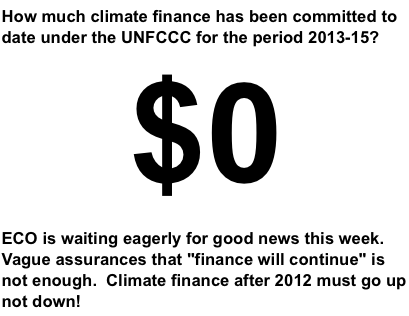In Durban, Parties agreed to conclude the LCA here in Doha. A successful closure necessitates that the critical issues are resolved or find homes in which further work can be done. In the LCA text tabled Monday, there were some gaping gaps, from text to tonnes.
ECO was shocked that text on 2013-2015 financial support turned up missing. There needs to be at least a doubling of fast-start financing, and a mandate for a political process to scale up financing to reach the 2020 $100 billion per annum target.
Adding insult to injury these two issues are also missing from the financing text advancing under the COP. No wonder there are strong calls for the MRV of finance if this is the state of play!
The 2-year Doha Capacity Action Plan and decisions on enabling environments including IPR and on the interlinkages between the different bodies under the Convention, including the CTCN and TEC, also seem to be missing in the the text.
Where there is text, ECO is concerned that it lacks ambition and environmental integrity. The work programmes under the SBs for clarifying commitments and actions inspire little confidence that such processes will lead to the increase in mitigation ambition so sorely needed up to 2020 and beyond.
Moreover, ECO is getting tired of seeing the same “rigorous, robust and transparent” text on common accounting. Instead, it is high time Parties actually agree some rules to give those words substantive meaning. A clear deadline to agree common accounting rules would help build confidence.
In addition, there are even some issues like base year and GWPs that can be agreed in Doha. Finally, only italics on the global goal and peak year – really? ECO wonders whether the climate is responsive to typographic emphasis rather than actual commitments.
The core questions, of supreme relevance to the ADP, are also unresolved – namely, equitable access to sustainable development and the review of the long-term temperature goal. Here a one year process for equity and a narrowly defined review of the long-term temperature goal under a robust body would go a long way in ensuring the ADP is well informed.
So how did we get here? Well . . . we all know that the U.S. is not willing to negotiate certain issues.*Other ship-jumpers, like Canada, Russia, Japan and New Zealand, aren’t helping things progress either, despite noise and sound bites in the capitals.
So please pay attention: successful closure of the LCA is vital in order to allow the ADP to get on with its own work to raise ambition in the near-term and to conclude a new, comprehensive global deal no later than 2015. Therefore ECO asks Parties to engage with the text in constructive manner and work towards a successful outcome and closure of the LCA. Come on negotiators and ministers . . . we know you can do it!![]()
